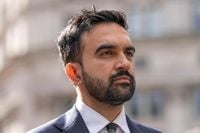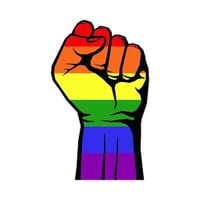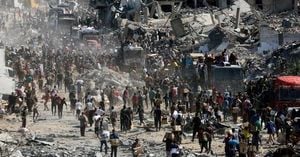New York City mayoral candidate Zohran Mamdani, a Democratic socialist and sitting State Assembly member, is facing intense scrutiny as his campaign navigates a storm of controversy in the final weeks before the November 4, 2025, election. The candidate, who has distinguished himself with strong stances on social justice and Middle East policy, now finds his campaign shadowed by allegations of accepting nearly $13,000 in potentially illegal foreign donations, as well as mounting criticism over his outspoken views on Israel and the Gaza conflict.
According to a detailed investigation by the New York Post, campaign finance records from the New York City Campaign Finance Board revealed that at least 170 of the nearly 54,000 contributions to Mamdani’s campaign originated from donors outside the United States. Federal and state law strictly prohibit campaign contributions from foreign nationals, with only U.S. citizens and permanent legal residents permitted to donate to political campaigns and political action committees. Candidates are required by law to return any illegal donations, and those who knowingly accept foreign contributions risk criminal prosecution and hefty fines.
Among the most notable of the foreign donors was Mamdani’s own mother-in-law, Bariah Dardari, a pediatrician based in Dubai, who contributed $500 to the campaign. The campaign returned her donation on the same day it was received, according to filings. Other prominent contributors included an environmental scientist from Australia and a Dubai-based investor, each pledging the maximum individual contribution of $2,100. Donations from abroad ranged from as little as $1 to the legal maximum.
Despite returning some contributions, the campaign has yet to refund 88 foreign donations, totaling $7,190 as of October 13, 2025. This delay has drawn sharp rebuke from political adversaries and good government groups alike. Republican mayoral candidate Curtis Sliwa voiced his concern, telling the New York Post, “Where there’s smoke, there’s fire, so I would be very concerned. There is probably a lot more in terms of foreign money.” Sliwa’s remarks echo widespread anxieties about the integrity of American elections and the specter of foreign influence.
Good government advocates have also sounded alarms, emphasizing the broader risks of foreign interference. As one critic told the New York Post, “It’s very problematic, not just for Zohran Mamdani, but anybody who has these kinds of PACs, because it’s a license to illegally funnel money. And foreign countries know you don’t have to go to war against America. All you gotta do is manipulate the election.”
In response to the mounting criticism, Mamdani’s campaign issued a public statement pledging full compliance with campaign finance law. “We will of course return any donations that are not in compliance with CFB law,” the campaign said, attempting to reassure both regulators and the public. The campaign has so far returned $5,608 in foreign donations, including the high-profile contribution from Dardari.
The complexity of campaign finance law is highlighted by the presence of legal donations from U.S. citizens living abroad. For example, Nupur Amin Marquardt, a U.S. citizen working as a consultant in Hamburg, Germany, contributed $50 to Mamdani’s campaign. Such contributions are permitted under federal rules, underscoring the challenges campaigns face in vetting donors with international ties. Marquardt, who has no personal connection to New York City, explained her motivation to support Mamdani’s campaign, stating, “It’s the only campaign I’ve seen that’s not trying to win by convincing a group of people to hate another group of people.”
The controversy over campaign donations comes at a critical juncture for Mamdani, whose campaign has raised approximately $4 million in private donations and secured $12.7 million in public matching funds. With about $6.1 million still in hand and election day fast approaching, the outcome of the ongoing investigation could have significant consequences for the race.
Meanwhile, Mamdani’s positions on Middle East policy have also attracted considerable attention and protest. On October 12, 2025, dozens of demonstrators gathered outside Brooklyn’s Congregation Beth Elohim to protest Mamdani’s visit to the synagogue. The congregation had invited all mayoral candidates to engage in dialogue with its members, but Mamdani’s vocal criticism of Israel—labeling its actions in Gaza as “genocide” and “apartheid”—prompted fierce debate among congregants. Senior rabbi Rachel Timoner noted that about half of the 82 questions submitted by the congregation’s 400 registrants focused on Israel, Zionism, and anti-Semitism, reflecting the deep divisions and anxieties within the community.
Some members of the synagogue were unsettled by Mamdani’s appearance, with one congregant telling the Jewish Telegraphic Agency, “The guy has a history of being pro-Palestinian and anti-Zionist, anti-Israel as a Jewish state. I am typical of this community, anti-the prosecution of the war by the current Israeli government. I’m against them, but I am for Israel as a Jewish state, and I’m not quite sure. He’s still sort of vague where he stands or not.”
Mamdani has consistently called for an end to the Israeli occupation and for peace to be pursued through democracy rather than war crimes. On the two-year anniversary of the October 7 Hamas attack, Mamdani issued a statement condemning the attack as a “horrific war crime” but also criticized Israel’s response and the U.S. government’s support, declaring, “The occupation and apartheid must end. Peace must be pursued through democracy, not war crimes, and our government must act to end these atrocities and hold those responsible to account.”
His stance has set him apart from his main rivals. Following the recent ceasefire agreement between Israel and Hamas, Mamdani welcomed the release of 20 remaining Israeli hostages as “profoundly moving” but warned that the “moral and human cost will be a lasting stain and requires accountability and real examination of our collective conscience and our government’s policies.” He pointed to a United Nations commission’s findings and cited the Gaza Health Ministry’s estimate that more than 65,000 Palestinians have been killed in the conflict.
In contrast, independent candidate Andrew Cuomo and Republican nominee Curtis Sliwa focused their statements on celebrating the release of hostages and lauding the ceasefire as a diplomatic and moral victory. Cuomo, polling as the runner-up, said, “It is a moral moment, a reminder of our shared humanity and the sacred value of every life.” Sliwa, meanwhile, thanked President Trump and expressed hope for lasting peace, emphasizing unity against terrorism.
Mamdani’s campaign has also drawn attention for its progressive platform, which includes support for free buses, city-owned grocery stores, rent freezes, no-cost childcare, and higher taxes on large corporations and the wealthy. His background—a son of Indian-born filmmaker Mira Nair and academic Mahmood Mamdani, and himself born in Uganda—adds further complexity to his public persona and the debates swirling around his candidacy.
Even as the campaign faces legal and political headwinds, Mamdani has remained active on the trail, participating in events such as the NYC Gaza 5K to raise funds for Palestinian humanitarian aid. On National Coming Out Day, October 11, 2025, he also spoke out on LGBTQ issues, seeking to broaden his appeal to New York’s diverse electorate.
As the campaign enters its final stretch, the twin challenges of campaign finance compliance and navigating contentious political debates will test both Mamdani’s resilience and the city’s appetite for change. Voters, now more than ever, are watching closely.





